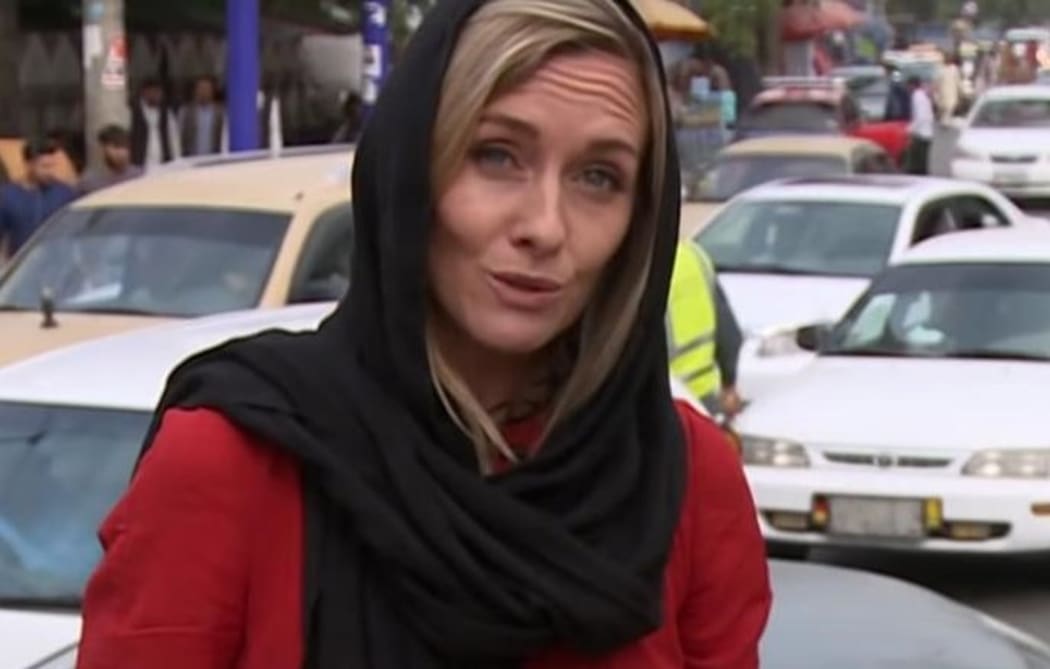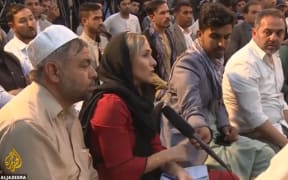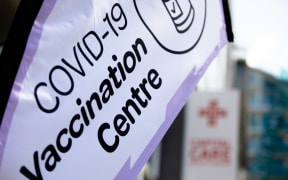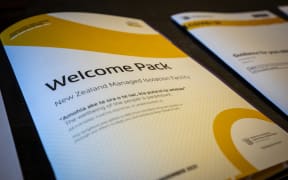Pregnant New Zealand journalist Charlotte Bellis, who is stuck in Afghanistan, says her MIQ application has been met with "technicalities and confusion" and she has been asked to apply under a different category.

Photo: YouTube screenshot
Having been declined an emergency spot MIQ Bellis was assured by senior Taliban officials she would be safe in Afghanistan, where she and her partner have visas.
However the hospitals and maternity services in that country were in dire straits, she said.
Bellis told Morning Report she signed up for an MIQ spot via the medical treatment pathway because it was the correct one and what pregnant women are told to apply under.
She said she had been asked to re-apply under a different category, which is for New Zealanders in a location or a situation where there is a serious risk to their safety.
"What does that say to women, does that mean there is no pathway for pregnant women?
"We signed up to the right one, the medical treatment is the correct one."
She said the authorities had all the information but their application was met with "clauses and technicalities and confusion".
"First it was 'we denied you because it's more than 14 days'. Then it was 'you don't meet a threshold for medical stuff', now it's something else.
"Why so many excuses and clauses? You have all the information."
Bellis and her photographer partner Jim Huylebroek submitted 59 documents in their application to gain an emergency MIQ spot, she said.
She said another country, that neither she nor her partner are citizens of, had come forward to help.
"As a New Zealand citizen, I have a legal right to return and I will do whatever the government wants in terms of quarantine or whatever, we're boosted."
Bellis said the government needed to explain "the ethics around that and how they're prioritising, particularly, foreign citizens over their own who are in dangerous situations".
She said if people tested negative and had the booster dose, then the government needed to revise its policy to allow them entry.
"New Zealand citizens are having to fight so hard and jump through various clauses and provide X amount of evidence and apply seven times and go to court. And at the same time, you've got DJs and athletes ... all foreigners coming in the back door. That's what I want them to look at and say, 'is this ethical?'."
She said the whole ordeal and choosing to move to Afghanistan was "surreal". But she was desperate to give birth in Aotearoa because the state of maternity care in Afghanistan was "absolutely dire", with limited power and medicines.
Delayed travel did not meet emergency criteria - MIQ
In a statement, head of MIQ Chris Bunny said Bellis had applied for an emergency allocation MIQ voucher on 24 January, but the MIQ date requested did not meet the emergency criteria. Travel has to be time-critical and urgent, within the next 14 days.
Bellis was invited to reapply within the 14-day window, or to contact MIQ if she intended to change her flights to return to New Zealand earlier, the statement said.
Shortly after her application, the team managing emergency applications contacted Bellis to provide her with additional information should she choose to change her flights, the statement said.
"She applied under emergency allocation category 1a(i) which applies to New Zealand citizens or residents requiring access to time-critical medical treatment for the applicant or their dependant, which has been scheduled in New Zealand and is unavailable or inaccessible in their current location.
"On Sunday 30 January 2022 we took the extra step of writing to Charlotte to explain that there is another emergency allocation category (1a(iii)) that she may wish to apply under, and we outlined the criteria that must be met."
The category is for New Zealanders in a location or situation where there is a serious risk to their safety and their only option is to return to New Zealand.
Pregnancy in and of itself is not considered an emergency under the emergency allocation criteria but certain conditions during pregnancy may mean that the high bar for an emergency was met, the statement said.
In a review in late October 2021 MIQ made no changes to existing categories, but agreed assessors would include consideration of the unborn child when making decisions where pregnancy is part of the emergency application.
Covid-19 Response Minister Chris Hipkins said Bellis had been encouraged by MIQ to consider moving her plans forward to fit the 14-day travel criteria.
"I understand officials have also since invited her to apply for another emergency category. I encourage her to take these offers seriously.
"I also understand she was offered New Zealand consular assistance twice since she returned to Afghanistan in early December but has not responded. Again, I encourage her to take up any offers of assistance."
The emergency allocation criteria can include for medical treatment if a mother is overseas and cannot get the required treatment where they are, he said.
'Safest option for her is to come back to her own country and give birth' - Lawyer
Bellis' lawyer Tudor Clee told First Up New Zealand women had been enduring traumatic births overseas because they could not return.
He said pregnancy was a medical condition but Ministry of Business, Innovation and Employment (MBIE) staff with no medical qualifications were overruling the advice of doctors and midwives.
Clee has asked Crown Law to review the legality of MBIE's decision in Bellis' case but said he would go to court if it was not resolved this week.
"New Zealand's entire Covid response has been science-driven.
"In this particular case, we have had The Royal College of Obstetricians and Gynaecologists, Plunket, the College of Midwives, the College of New Zealand Psychiatrist, Sir Peter Gluckman all state that it is medically unethical to force New Zealand women to give birth overseas or to give birth alone in New Zealand without their partners. And it actually risks the health of the mother and the potential long-term health of the unborn baby."
Clee was unsure if the different category Bellis had been invited to apply under applied to her. He said Bellis did not have a visa to stay in her partner's country, Belgium.
"The safest option for her is to come back to her own country and give birth where she knows that the doctors speak her own language, that she's allowed to be there and then if there's a complication with the baby that she has family support, and that that baby can be taken care of adequately in our excellent New Zealand medical system.
University of Otago epidemiologist Michael Baker said a separate pregnancy category for MIQ would be "useful".
But he told Morning Report that MIQ was still serving its purpose, and delayed the arrival of the variant in the community, giving people more time to get boosters and vaccinate children.
He said MIQ was essentially a "delaying mechanism".
Nevertheless, Omicron cases in the community were expected to double every two to four days, he said.
Baker said currently about 500 people went through MIQ a day.
He said the government had announced that after February the country would be transitioning to self-isolation "and the big effect, if there is, it will allow thousands of people to come in a day instead of just a few hundred".
Hipkins said MIQ had served New Zealand well, saved lives and kept the health system from being swamped
."The government, however, has signalled there will be changes at the border and will be announcing these soon."






